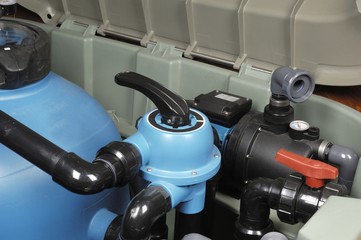Are Pool Heaters Noisy?
Are Pool Heaters Noisy?

The noise you’re hearing appears like it’s coming from your pool heater.
Don’t panic! Rarely pool heaters do make unusual noises. Let’s look at why that occurs.
A Dirty System
A popular noise made by a swimming pool heater is grinding or grating.
You may have an obstruction as a result of debris. Debris can deter water or gas from flowing through the heater.
You should begin your troubleshooting with a manual flush of your system. Check your manual for guidelines on how to perform a flush. If you’re not comfortable with the process, you can always call a pool service and repair expert and have them come out and do it for you or demonstrate to you how, so you can take care of it next time.
Hard Water Scale
Swimming pools are as vulnerable to the effects of hard water as the fixtures in your household.
If you can’t remove the noise by performing a system flush, you may have a buildup of hard water scale. While the hard water scale is just visible at the waterline, it also develops in the pipes and other parts of the pool. If you have a noisy heater, you might have scale buildup inside the heat exchanger. You’ll require to scour the heat exchanger—a DIY task, but you can also call your pool service company to take care of for you.
What’s That Whistling Sound?
Swimming pool heaters do make noise, but if your heater begins whistling, it’s time to put on your detective hat.
Gas heaters rely on both proper gas pressure and clean burners. If you have problems with either of those, you may hear whistling—the whistling noise results from the burners.
Check your gas pressure—low pressure can noise in the burners.
The Faulty Pressure Switch

If neither of these fixes takes care of the noise, it’s time to contact for pool heater repair.
Sometimes the noise issue comes from a faulty pressure switch. If that’s the case, the pump switches off, but the heater continues operating.
Replacing a pressure switch isn’t hard, but you do need your owner’s manual. Even if you’re an avid DYI pool technician, reading the guide can save you time and a world of headaches. If nothing else, your manual can assist you in making sure you purchase the appropriate switch for your heater.
When all else fails, don’t be afraid to call in the professional pool persons.
Need Assistance with a Noisy Pool Heater?
When you’ve done everything, you know to troubleshoot the noise and can’t make it go away, you require assistance. Sound often indicates a malfunctioning pool heater, and if it’s not fixed, you may end up forming a safety hazard.
If you’re not sure about the noise, or any other situation with your swimming pool, call Florida Pool Heating Specialists. We know pools and their components and can get you back to swimming right away!
